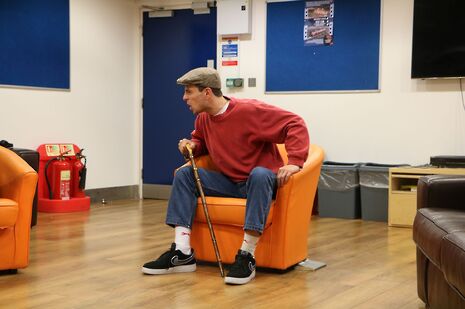The Homecoming review
An incredibly difficult performance that strikes the right notes

The preview written for Varsity promised a focus on and a control over Pinter’s language – words which are terrifying and yet also endearing, comic and yet also unsettling. It is this confidence about what they are saying that comes through most clearly in the actors’ lines in this play, as they unravel the dark comedy that is Pinter’s The Homecoming.
This play is difficult to watch. Director Angus Jackson makes his characters have a hardness, a grim bitterness which perfectly suits the conversations which seem to approach emotional matters only to withdraw from them into a violent outburst. The play’s climax is expertly managed and skilfully executed, creating in the audience a sense of disgust but also daring us to keep watching: we become strange voyeurs towards the end of this final act, and the characters take pleasure in this manipulation. All of the actors display, in this scene, such a bravery of acting, not shying away from the hideous movements in the script but embracing them and carrying them to their full extreme – it is the only way Pinter can be done.
"The play’s climax is expertly managed and skilfully executed, creating in the audience a sense of disgust but also daring us to keep watching"
A particular mention should go to Theodora Mead for her performance of Ruth. The only woman in this household of men, her role shifts from object to ruler, pivoting on male sexuality and the insatiable lusts of these men who have been cooped up together, womanless, for so long. What was most commendable in Mead’s acting was her amazing physical stillness in the opening scenes, a stillness which added to the sense of her being out of place in the household, an object for the men to gawp at and label as a prostitute and eventually decide to keep with them to satisfy their sexual needs. In the scene between Lenny and Ruth there is a power in her unflinching stillness which transforms into active power as the scene draws to a close – the tension is shuddering; the complete silences in the audience which the cast achieve throughout are impressive.
What is most to be praised in this production, however, is the way in which the actors handle the language. Jackson and assistant director Helena Brann have clearly spent time working on the rhythms of Pinter’s speech, not just on the pause but also on the relationship between each part of the line, and the effect is almost musical. While all of the actors achieve this rhythm, I was particularly impressed with Isaac Zamet’s performance as Max: the anger with which he speaks, which rises at moments which can seem completely ridiculous, and the pure aggression of his every interaction, can be hard to maintain, but Zamet’s Max oscillates between deeply humorous and terrifyingly unnerving – and never once are his words lost at the end of the lines.
Where there was room for improvement, I felt, was in the blocking of the scenes. There were some moments of symbolic brilliance – for example, when Ruth takes Max’s chair in the centre of the stage for the final interaction, representing her taking control of the family in her femininity – but in general I felt there could have been more creative blocking, particularly in such a large space as the Robinson auditorium. There were moments, often the ones with underlying sexual implications, that I felt could have been drawn out and experimented with more physically, and some of their power was possibly lost.
The set, too, posed a problem for me. It must be said, as the play went on, I grew to appreciate its appropriateness more and more, creating a living room which felt not quite right, not quite a home, with something unsettling in its bareness but also gratuitous ornaments that I could not quite put my finger on: this fit with the play’s general sense of the unnerving. Where it fell short, I would argue, was that the actors did not interact with it enough. Apart from Joey boxing in the mirror and one significant movement of the chair in the scene between Ruth and Lenny, the set felt a bit like a background against which the action was happening, rather than a room which the characters were actually inside. A few moments of interaction with the set, acknowledgement that this is a room of a house in which the characters have lived for so many years, could have added a little more coherence and authenticity.
Putting on Pinter is an incredibly difficult task – getting the timing of the pauses, capturing the comedy and the darkness, presenting the relationships between the characters not just as completely monstrous but also as somehow human. I really admire Jackson and his cast for what they have done here – and I think they did a lot of things right. Pinter’s words, his timing, his pauses are what matter most in this production, and as a result the production feels in control – and thus even more disturbing. Each of the actors held their own throughout the performance, sticking closely to their character even in the moments when they were not talking, giving the audience not one single moment of rest or reassurance. It’s always a good sign when the audience are afraid to make any noise during a silence on stage.
 Features / Should I stay or should I go? Cambridge students and alumni reflect on how their memories stay with them15 December 2025
Features / Should I stay or should I go? Cambridge students and alumni reflect on how their memories stay with them15 December 2025 News / Cambridge study finds students learn better with notes than AI13 December 2025
News / Cambridge study finds students learn better with notes than AI13 December 2025 News / Dons warn PM about Vet School closure16 December 2025
News / Dons warn PM about Vet School closure16 December 2025 News / News In Brief: Michaelmas marriages, monogamous mammals, and messaging manipulation15 December 2025
News / News In Brief: Michaelmas marriages, monogamous mammals, and messaging manipulation15 December 2025 Comment / The magic of an eight-week term15 December 2025
Comment / The magic of an eight-week term15 December 2025









